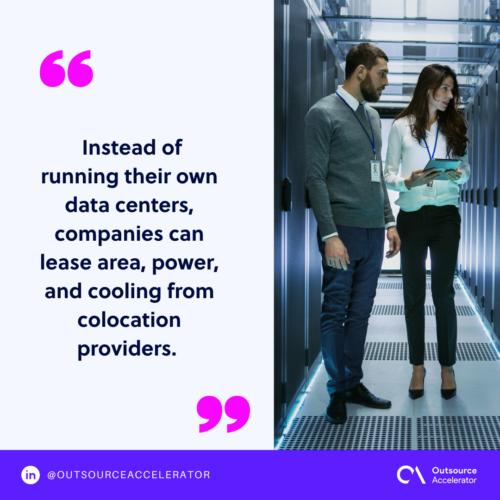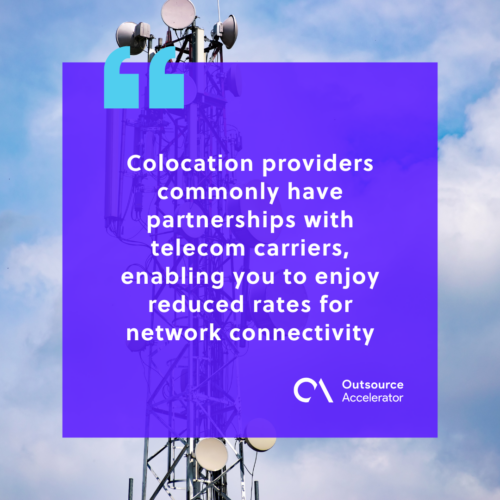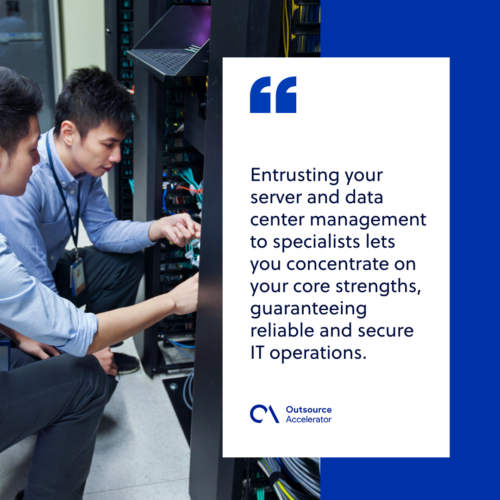Colocation services: Definition, benefits, and implementation

Modern businesses depend on data centers to store and handle their information. Yet, overseeing and sustaining these centers can be intricate and expensive.
This is where colocation services play a role.
In this article, we’ll explore colocation’s role in improving overall infrastructure management. We’ll also discuss its implementation, including choosing the right providers and setting up equipment.
What is colocation?
Colocation involves placing servers and IT tools in an external data center. Instead of running their own data centers, companies can lease area, power, and cooling from colocation providers.
Colocation services companies ensure a safe and regulated setting for businesses to manage their essential systems.

Advantages of colocation services
Colocation services offer numerous advantages for firms seeking reliable and efficient data center solutions.
Some key benefits include:
Reliability and uptime
Colocation services bring a major advantage in terms of reliability and uptime. Colocation services providers have advanced infrastructure consisting of:
- Backup power
- Generators
- Cooling systems
This guarantees continuous operation of your servers and equipment, even during power outages or malfunctions.
Placing your infrastructure in a facility that reduces the chances of downtime and helps maintain seamless business operations.
Scalability and flexibility
The speed at which you can adjust your IT infrastructure is vital. Colocation services offer the freedom to modify your server capacity as required.
Adding or removing servers is simple, without large hardware expenses. This adaptability lets businesses respond to shifts in demand and guarantees their infrastructure grows in tandem with their expansion.
Cost-efficiency
Establishing and managing an on-site data center can be highly costly. Expenses tied to buying and upkeeping server hardware, power, and cooling systems, and dedicated IT personnel can accumulate swiftly.
Colocation services provide a budget-friendly option. By sharing infrastructure expenses with other businesses, you can notably cut costs.
Furthermore, colocation providers commonly have partnerships with telecom carriers, enabling you to enjoy reduced rates for network connectivity.
Backup and disaster recovery
The impact of data loss and interruptions can be severe for businesses.
Colocation services sites are built to endure natural disasters like floods or earthquakes and have backup systems to preserve data reliability.
In case of unexpected events, third-party providers have backup power, data replication, and off-site storage choices. They allow businesses to retrieve their data and continue operations with minimal disturbances swiftly.

Factors to consider when selecting a colocation provider
When picking a colocation provider, weighing various factors to ensure they align well with your business needs is important.
Consider the following before making a decision:
Location
The data center’s location is a key consideration. Choosing a colocation provider near your business or audience is preferable, cutting delays and ensuring fast server access.
Also, check the distance to transport centers and areas prone to disasters to evaluate possible risks.
Security measures
Security holds utmost importance when entrusting your infrastructure to a colocation facility. Seek out providers with strong physical security, like:
- Constant surveillance
- Access control
- Biometric authentication
Also, inquire about their cybersecurity approaches, including firewalls, intrusion detection, and data encryption, to shield your sensitive data.
Connectivity and network services
Strong and consistent connectivity is crucial for businesses dependent on their IT setup.
Verify if the colocation provider allows carrier choice, giving you options from different telecom carriers. This empowers you to opt for network services that align with your needs.
Additionally, ask about the provider’s network capacity, redundancy, and peering agreements to guarantee top-notch performance.
Network infrastructure
A strong network setup is essential for your colocation requirements.
Check if the provider has backup network equipment and multiple internet service providers (ISPs) to ensure reliability and eliminate single points of failure.
Ask about their network monitoring abilities, as vigilant supervision can help identify and address potential issues before they escalate.
Interconnection options
Colocation centers frequently provide interconnection choices, linking businesses with other groups and service providers. These links can boost efficiency, reduce delays, and foster business cooperation.
See if the provider has direct connections to key cloud service providers, internet exchanges, or other pertinent partners that can contribute to your business activities.
SLAs and contracts
Thoroughly examine the service level agreements (SLAs) and contracts provided by colocation providers.
These documents detail the commitments and assurances of both sides. Focus on uptime commitments, support response times, and any extra services that might come with a fee.
Grasping these agreements makes sure your expectations match the services delivered.
Setting up equipment in a colocation facility
Once you have selected a colocation provider, setting up your equipment begins.
Equipment preparation and packaging
Before moving your servers and equipment to the colocation site, ensure they are well-prepared and packed.
Make a list of all items, label cables, and parts, and note the setup for an easy installation. Pack the pieces of equipment securely to shield them during transportation and guarantee their safety upon arrival.
Data center migration process
Transferring your equipment to the colocation facility is called migration. Working with an experienced colocation provider is crucial here.
Your chosen colocation services provider will organize the logistics, such as transportation, handling, and unpacking. To ensure a smooth migration, follow your provider’s guidance and stick to the procedures.
Rack deployment and configuration
After your pieces of equipment are in the colocation facility, they must be correctly placed in the racks.
Collaborate with the provider’s technicians to ensure secure mounting, well-organized cables, and accurate power and network connections.
Verify that each device works as intended and handle any required setup or software installation.

Colocation services improve infrastructure management
Colocation services offer businesses a substantial enhancement to their infrastructure management.
Entrusting your server and data center management to specialists lets you concentrate on your core strengths, guaranteeing reliable and secure IT operations.
Additionally, adhering to proper procedures for equipment readiness, data center migration, and rack setup is vital for successful execution.
Colocation services empower your business to leverage specialist expertise and infrastructure, ultimately bolstering your IT management and supporting your growth aspirations.







 Independent
Independent




